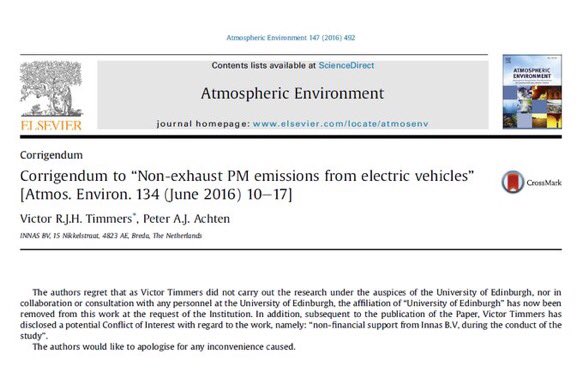This is another one of those whack-a-rat stories that will not go away.
Last year there were reports of electric vehicles causing higher particulate matter that ICE, based on the false assumption that because some models are heavier, they must cause higher tyre and brake pad wear. It ignored all other factors such as regen not requiring as much use of the friction brakes and smoother power delivery and eco tyres not wearing the rubber out as quickly. For example, my Ampera is still on original rear tyres and all four pads at 60,000 miles.
It was quickly discovered that the original paper was written by an undergraduate engineering student, aided by a Dutch consultancy with interests in components for ICEs and conventional hybrids. It was deeply flawed. The student's institution, the University of Edinburgh, has disowned the paper, as can be seen here:

However this did not stop the story resurfacing again earlier this year in the magazine of the IET, nor again yesterday twice in the Guardian and BBC.
London should lead in showing electric cars will not tackle air pollution
Electric cars are not the answer to air pollution, says top UK adviser
Fewer cars not cleaner ones key to tackling air quality - BBC News
This time around it looks like a concerted effort by the anti-car brigade with multiple articles. If there is anything more sinister behind it, then it is a clever move to get the left on board with their cause. While encouraging more people onto public transport or to cycle is laudable, the timing of this seems like a counterattack from the 2040 announcement.
However, the main spokesman this time is Professor Frank Kelly of King's College London. What is worrying is that he chairs the government advisory committee on the medical effects of air pollutants - so this may just affect public policy.
His details can be found here:
King's College London - Professor Frank Kelly
While the source of this myth has been discredited as having a potential conflict of interest, I am intrigued as to why it has been picked up by a leading academic. Has anyone seen any other research that specifically shows a link between EVs and particulate matter? And does the professor have any interests outside of academia?
Last year there were reports of electric vehicles causing higher particulate matter that ICE, based on the false assumption that because some models are heavier, they must cause higher tyre and brake pad wear. It ignored all other factors such as regen not requiring as much use of the friction brakes and smoother power delivery and eco tyres not wearing the rubber out as quickly. For example, my Ampera is still on original rear tyres and all four pads at 60,000 miles.
It was quickly discovered that the original paper was written by an undergraduate engineering student, aided by a Dutch consultancy with interests in components for ICEs and conventional hybrids. It was deeply flawed. The student's institution, the University of Edinburgh, has disowned the paper, as can be seen here:

However this did not stop the story resurfacing again earlier this year in the magazine of the IET, nor again yesterday twice in the Guardian and BBC.
London should lead in showing electric cars will not tackle air pollution
Electric cars are not the answer to air pollution, says top UK adviser
Fewer cars not cleaner ones key to tackling air quality - BBC News
This time around it looks like a concerted effort by the anti-car brigade with multiple articles. If there is anything more sinister behind it, then it is a clever move to get the left on board with their cause. While encouraging more people onto public transport or to cycle is laudable, the timing of this seems like a counterattack from the 2040 announcement.
However, the main spokesman this time is Professor Frank Kelly of King's College London. What is worrying is that he chairs the government advisory committee on the medical effects of air pollutants - so this may just affect public policy.
His details can be found here:
King's College London - Professor Frank Kelly
While the source of this myth has been discredited as having a potential conflict of interest, I am intrigued as to why it has been picked up by a leading academic. Has anyone seen any other research that specifically shows a link between EVs and particulate matter? And does the professor have any interests outside of academia?


